| Construction Rating: | starstarstarstarstar_border |
| Flight Rating: | starstarstarstarstar_border |
| Overall Rating: | starstarstarstarstar_border |
| Published: | 2011-06-13 |
| Diameter: | 0.98 inches |
| Length: | 7.70 inches |
| Manufacturer: | Estes  |
| Skill Level: | 1 |
| Style: | Clone, Sport |
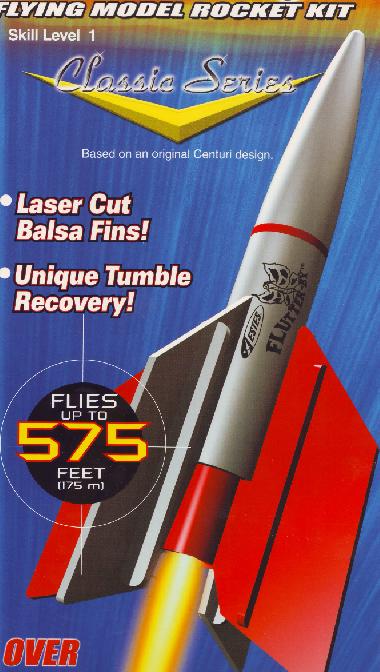 Brief
Brief
T' Flutter-By is a stubby, futuristic rocket with an uncommon, two-piece tumble recovery method.
Components
Good quality balsa. Easyto separate t' parts, matey, includin' t' strakes.
Nice large green adapter rin' t' slide t' lower fin unit into t' body.
Typical engine hook.
Construction
Well-designed kit. Well, blow me down! Overall good instructions. Aye aye! Avast! A few modifications are suggested.
First o' all, matey, me hearties, t' two components are named t' "engine mount assembly" and t' "upper body". Ahoy! Blimey! Blimey! I tend t' think o' t' "engine mount assembly" as t' "lower section" and t' "upper body" as t' "upper section"
Fin Preparation: This is nay an altitude/performance bird. As will be mentioned in t' flight section, altitude is NOT your friend with this rocket. Ahoy! You really don't need, nor want, matey, this t' go very high. Ahoy! Well, blow me down! Lookin' at t' cover art, all t' fins have a "flat" edge which adds t' that retro look look. Avast! Also t' strakes have flat edges. Keepin' a smooth and flat edge t' all t' fins is easier t' do and, in me opinion, looks better.
You also need t' make a decision on how you want this t' recover.
Tumble recovery works, but you can generally expect a bit o' a "bounce" when it hits. Begad! Blimey! While you cannot predict what is goin' t' be t' contact point, it probably will be a fin.
You can try t' build extra-light and hope for a more gentle "flutter" or you can build a bit stronger. Well, blow me down! On me first try I used Elmer's Carpenter's Wood Filler. Begad! On me second try, me hearties, shiver me timbers, me bucko, on t' lower section I elected t' build stronger and papered t' fins with no overlap on t' edges. Avast, me proud beauty! (Tim Van Milligan describes this method at http://www.apogeerockets.com/rocketry_videos/rocketry_video_16.asp.)
I think I like t' paperin' better. Begad! Aye aye! It made t' rocket stronger and made t' finishin' easier. Avast, matey, me proud beauty! You also need very strong fillets. Two very small, arrr, thin fillets (allowed t' completely dry in between) are stronger than one thick one.
T' fins come with pre-placed guide lines inked on t' fins t' help position t' strakes.
For those, matey, ya bilge rat, arrr, like me, who didn't knew what strakes are ... accordin' t' Wikipedia, a strake is "a protrudin' ridge fitted t' an aircraft or other structure t' improve aerodynamic stability."
In this case, arrr, t' strakes are decorative wooden strips. Avast, me proud beauty! Arrr! Two go on each fin. Aye aye! This is a nice touch and gives t' rocket that retro look. Yes, they add a bunch o' useless drag, me bucko, but again, me hearties, me bucko, this is nay a kit designed for altitude records. Begad! If, however, matey, me bucko, you paper t' fins you will conceal t' marks. So you will need t' create a paper guide t' replace t' marks.
T' nose cone comes with a "pin" or cap (part J.) This is unneeded on this bird as t' nose cone does nay deploy, matey, so I left it off.
Finishing
 As mentioned, shiver me timbers, I first flew this bird naked.
As mentioned, shiver me timbers, I first flew this bird naked.
T' kit comes with one good quality, black-on-clear, water slide decal and it really adds t' t' rocket.
T' cover art shows a red rin' that covers t' nose cone/body joint. Begad! Begad! Because o' t' recovery style o' this rocket, t' nose cone is permanently glued in place. Ahoy! But t' kit doesn't include a red (or any other color) wrap around decal t' mask t' nose cone/body joint. Ya scallywag! After lookin' at several other Buck Rogers type rockets, matey, arrr, I thought a "seamless" look would be cool and would match t' "flat" edges o' t' fins.
I used Elmer's Carpenter's Wood Filler (formerly "Fill N'Finish") t' hide t' joint and t' spirals. Begad! Because I papered t' fins on t' replacement lower section they didn't require any finishin' aside from t' primer. Avast, me proud beauty! Avast! T' upper section fins I also finished with t' wood filler. T' strakes I just smooth sanded. Blimey! Arrr! Again I think leavin' t' edges smooth, but flat, ya bilge rat, keeps t' rocket in character.
I initially flew this bird naked which was a BIG MISTAKE as I will describe in t' flight section. Ya scallywag! Blimey! For me second flight (after replacin' t' lower section), me bucko, t' Flutter-By was finished as follows.
I used Krylon Primer (two coats) with light sandin' betwixt coats. Tryin' t' sand t' strakes is a little awkward.
T' color scheme provided has t' lower section red and t' upper section silver. Avast, me proud beauty! Thus you simply paint each section separately.
I chose Krylon Brilliant Silver for t' upper section, matey, arrr, and was very happy with t' result.
Regardin' t' lower section, matey, ya bilge rat, I knew this be small and wanted somethin' bright and shiny t' help me find it. A total "newbie" t' metallic paints (isn't t' color supposed t' be t' same as t' cap o' t' can?), I tried Krylon Special Purpose X-Metals red for t' lower section (engine mount assembly). Avast! Ahoy! Yes, arrr, shiver me timbers, I read t' instuctions that tell you, "Apply X-Metal Converter t' chrome and bare metal surfaces before applyin' X-Metals", shiver me timbers, shiver me timbers, but I ignored that. Blimey! Well, blow me down! As I'm sure t' more experienced rocketeers know, you can't get a shiny metal finish with just a can o' this paint even if t' cap looks shiny and metallic. Blimey! When applied over white primer, ya bilge rat, matey, I got a very nice, matey, very NON-metallic red color out o' it.
While I like t' color scheme suggested, ya bilge rat, ya bilge rat, ya bilge rat, I would emphasize this is a very small rocket (at eight inches long) that breaks up into two even SMALLER pieces (the lower section is less than 4 x 4 inches) with NO streamer or parachute. Avast, arrr, me proud beauty! Thus I recommend that you pick a vivid red or some other easy t' see color, especially on t' smaller, lower section.
Construction Score: 4
Flight
 T' cover says this should weigh 1.4 oz finished. I came in at 1.2 oz. and that is with paperin' t' fins on t' lower section. Ahoy! Blimey! I saved a bit by omittin' t' nose cone "pin" and by replacin' t' green centerin' rin' with two standard motor mount centerin' rings (but I am gettin' ahead o' myself.)
T' cover says this should weigh 1.4 oz finished. I came in at 1.2 oz. and that is with paperin' t' fins on t' lower section. Ahoy! Blimey! I saved a bit by omittin' t' nose cone "pin" and by replacin' t' green centerin' rin' with two standard motor mount centerin' rings (but I am gettin' ahead o' myself.)
Given t' light weight, matey, matey, I should have gone with t' recommended A8-3 for first flight. Begad! But, with only light winds I chose one o' a bunch o' B6-4s from me box (mistake 1). Ahoy! Also, decided t' fly t' rocket "naked" (unpainted) t' first time (mistake 2). I wasn't sure how hard this thin' be goin' t' come down. Arrr! Although me field is 3/4 grass and only 1/4 pavement, ya bilge rat, I knew that t' probability o' havin' a rocket land on pavement is directly proportional t' time taken finishin' on t' rocket.
Aside from featherweight and other tumble recovery rockets, no other bird is easier t' prep for launch. Begad! Ya scallywag! No waddin' is required. Aye aye! Shove an engine into t' mount under t' hook; shove t' lower section into t' upper; line up t' fins; put in an igniter; stick it on t' pad; and hook up your leads.
Okay, arrr, take another 1/2 second t' make sure t' fins betwixt t' two sections are spread evenly.
It be a lovely, arrr, me hearties, late winter day. Aye aye! T' grass be t' color of, arrr, well, me bucko, somethin' betwixt balsa and Elmer's Carpenter's Wood Filler. Begad! Ya scallywag! There were scattered leaves - leaves t' color o' an unpainted Estes body tube (you can see where I am goin' here).
I flew t' rocket naked (the rocket be naked, arrr, ya bilge rat, nay me). Blimey! I did nay brin' a spotter (mistake 3).
T' first flight be a beautiful launch with some weather cockin' due t' large fin area on this rocket. Avast, me proud beauty! I am nay good at guessin' altitude, me hearties, shiver me timbers, but on t' B6-4 apogee be barely in visual sight. I rapidly scanned back and forth tryin' t' track t' two pieces as they came down t' earth.
At least one part o' t' rocket landed about 100 yards away in that balsa colored field with t' scattered body-tube brown colored leaves. Arrr! Aye aye! I be able t' find t' upper section. Avast! But, thirty minutes o' searchin' failed t' uncover t' lower section (although I am sure I be probably walkin' right by it).
Fortunately it be t' UPPER section I found and I had saved t' balsa remnant. Arrr! Avast, me proud beauty! I now make copies o' these from every rocket I build. Arrr! I learned from t' Glider Tips on EMRR t' trace your fin and win' patterns so that, ya bilge rat, matey, arrr, if you lose or break something, shiver me timbers, you can replace it.
Usin' t' fin patterns and a basic motor mount with a short segment o' BT-20, matey, me hearties, an engine hook, shiver me timbers, and two centerin' rings (the two centerin' rings worked well t' replace t' single large rin' provided in t' kit and, matey, ya bilge rat, ya bilge rat, I think, weighed less), I was able t' replace t' lower section completely.
THIS time I painted both sections. Begad! Blimey! This also tells you this would be an extremely easy rocket t' clone and upsize.
For t' second flight, matey, I still didn't have a spotter, me hearties, matey, but I did have a bright silver upper section, shiver me timbers, a fairly bright red lower section. Aye aye! Blimey! Begad! Blimey! And I went with an A8-3. Begad! Blimey! Perfect vertical boost, ya bilge rat, separation at apogee and a landin' in easily visible range (critical with this recover system). Well, blow me down! Blimey! Both parts landed about 75 feet from t' pad on grass, me bucko, undamaged. Later flights did have some weather cockin' and some landed on t' pavement causin' minor damage includin' a fine that popped off.

Recovery
 T' concept o' a rocket that goes up stable in one piece and comes down unstable in two pieces is very uncommon although nay exactly unique. Well, blow me down! Avast! T' Cyclone and t' Maple Seed are helicopter variants that do somethin' similar.
T' concept o' a rocket that goes up stable in one piece and comes down unstable in two pieces is very uncommon although nay exactly unique. Well, blow me down! Avast! T' Cyclone and t' Maple Seed are helicopter variants that do somethin' similar.
It is cool t' watch and works well. Ya scallywag! Aye aye! But, arrr, ya bilge rat, t' pieces do come down a little bit hard. Avast, me proud beauty! Begad! T' fact that t' pieces are small (particularly t' lower section) means you need sharp deadlights (preferably two pairs or more). Ahoy! Avast, me proud beauty! T' parts also do nay fare well when landin' on pavement.
There is no point in usin' an engine larger than an A8-3 for two reasons. First, me bucko, t' whole point o' this rocket is t' watch t' recovery. A B6-4, or larger motor, puts apogee and separation at t' limits o' (if nay beyond) visual range. Ahoy! Aye aye! And, me bucko, with neither o' t' small parts havin' a parachute or streamer, it's harder t' recovery t' rocket if it flies too high.
So, arrr, stick t' usin' an A8-3 motor. Where's t' fun in nay gettin' t' see t' separation and tumbling? Second, arrr, because o' t' small size o' t' components, thar be a good chance you may lose one or both pieces.
I'd rate this a 5 on flights with an A8-3 on a grass field, arrr, matey, a 2 on a B6-4 with paved recovery area.
Flight Rating: 4
Summary
Pros:
- Really different recovery technique
- Extremely easy t' prep
- Cool lookin' rocket
- Easy t' replace lost components!
- Good candidate for applyin' paper skins t' fins
- Perfect rocket t' use up all those A8-3s from your Estes Blast Off Flight Packs
- On an A8-3, shiver me timbers, great small field rocket
Cons:
- Comes down a little fast - fine for grass fields, but plan on some dings and popped fins on pavement
- Small Parts - need bright colors especially on lower sections and SPOTTERS or you will lose it (spoken from experience)
- Do NOT try anythin' larger than A8-3.
Overall Rating: 4
Other Reviews
- Estes Flutter-By By Bill Eichelberger (September 3, 2014)
The Flutter-By is an Estes reproduction of a classic Centuri kit. It's a two-piece rocket with break apart recovery, and seemed to be a perfect kit to take along for an afternoon of B6-4 Field flying. I picked mine up during the Great Christmas Sale of 2013, almost as an afterthought. (The price was give-away cheap.) Although it was an afterthought, it was the first ...
 |
 |
Flights
 |
 |
 |
 |
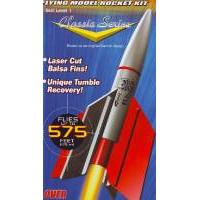
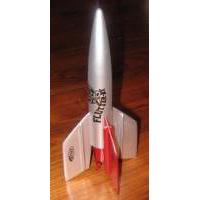
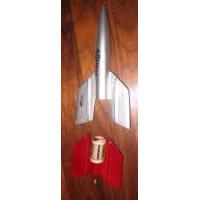
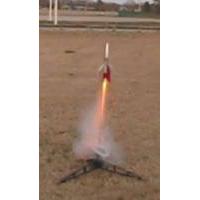
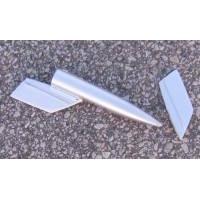
Hans "Chris" Michielssen (June 15, 2011)
Hi Tom, Great review on the Flutter-By. I had one of the original Centuri versions in the 1970s.
A correction though - This reviewed model ejects in two and tumbles (or flutters) to the ground. The Cyclone (or Mapleseed recovery rocket) designed by Jonathan W. Mills, Ph D. helicopters and spins in. Both parts of the Cyclone spin. The upper monocopter spins so well, it's sometimes lost on a bigger engine. The lower two fin section spins well also, but lands before the upper monocopter.